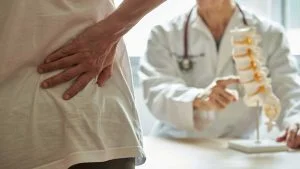Osteoarthritis of the Spine
The prefix osteo-, coming from “bone,” -arth, meaning “joint,” and the suffix -itis meaning “inflammation” give a tremendous hint as to what osteoarthritis (OA) is. This degenerative and progressive form of arthritis (joint inflammation) is highly associated with the aging population and lives in the spaces between our bones where they meet and articulate. This post focuses on osteoarthritis of the spine, where the disease impacts the intervertebral discs, facet joints, and the supporting structures of the spine such as the muscles, tendons, and ligaments.
Basic Spine Anatomy
33 vertebrae line the vertebral column supporting the human trunk. These vertebrae are divided among the different segments of the spine, including the cervical (7), thoracic (12), lumbar (5), sacrum (5; fused), and coccyx (4; often fused). The spine permits flexible movement while maintaining a strong, secure center from which the extremities extend. The vertebrae themselves are beautiful, complex bones that have many purposes, ranging from the attachment of ribs and muscle to the precise and robust housing of the spinal cord. It is on the attachment sites between the vertebrae at the intervertebral discs and the ribs that the osteoarthritis forms. The mobile parts or joints of the vertebrae originate at the disc-facet complexes, which are the regions most prone to osteoarthritis.
Symptoms of Osteoarthritis in the Spine
Back pain presents itself when the inflammation occurs and is classified as a common symptom in this disease’s case. This pain inhabits the lower back most often and can dissipate when the individual lays on their back. Other symptoms include:
- Stiff back with limited range of motion (when reaching for things or trying to tie your shoes for example)
- Sore muscles due to stiffness
- Swelling
- Tenderness at the site
- Pain that radiates into the shoulders due to posture compensation
- Hip and/or knee pain
- Kyphosis – shoulder curvature that compensates for the back pain
Treatment
Osteoarthritis of the spine comes in cycles, disappears permanently, or remains chronic in certain individuals. To treat and prevent OA, the individual and their physicians must take the right steps to do so. This could include diagnostic tests including x-rays or MRIs (for disc analysis), or a referral to the right physical therapist for an exercise and rehabilitative plan. Physical therapy is where Mid-County comes in, where we provide numerous treatments to help improve and eventually rid the patient of their symptoms. In the strengthening plan, our physical therapists commit to analyzing the OA, looking at all aspects of the individual’s experience with the disease, and creating a program that can focus on strengthening flexibility and functionality. The physicians may also recommend certain medications, as well as NSAIDs (non-steroidal anti-inflammatory drugs) to reduce inflammation and pain, which the patient may pair with treatment from physical therapy. Other treatment choices could include:
- Ice
- Heat
- Anatomical and gait analysis
- Stretching
- BioQPulse
- Kinesio Taping
Not all back pain is osteoarthritis, but it is important that you see your doctor today if there has been a consistent, nagging pain in your back. If you are searching for the right physical therapy to treat your OA, contact Mid-County Physical Therapy today.
Call us at (703) 763-3922 and schedule your appointment today!


